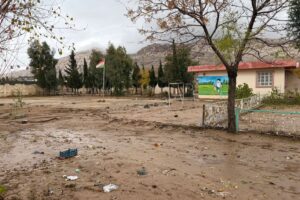
Israel has lost its way in the Gaza war. It has no clear direction, and therefore no chance of achieving its two declared objectives: returning the hostages and defeating the terrorist organization Hamas.
This is the direct result of Israel’s lack of coherent policy. From the outset, Prime Minister Benjamin Netanyahu was urged to formulate a clear strategy and war goals so the IDF could guide its operations accordingly. But, under pressure from the messianic wing of his government, Netanyahu set an unattainable and undefined objective: “total victory.” With those two words uttered, he condemned the war to become an endless one.
Netanyahu has repeatedly claimed that (total) victory is within reach. At one point it was “a matter of months,” at another “a step away.” Each speech with its own promise, but the victory only grew more distant the closer Israel seemed to get. It’s puzzling that Netanyahu, who prides himself on his knowledge of history, would bind himself to such a commitment. But clearly, the politician in him overrode the statesman: every move aimed at the evening’s speech, the morning’s headlines, and the weekend’s polls. Beyond that, it’s all in God’s hands.
This obsession with grandiose promises has infected his ministers too. From Defence Minister Israel Katz, who repeatedly warned Gaza’s gates of hell would open if the hostages weren’t returned, to Finance Minister Bezalel Smotrich, who swore he would quit the government if humanitarian aid entered Gaza. The hostages remain in captivity, the aid has entered, and life goes on, because in Israeli politics, promises are made to be broken.
Infected his ministers with the same promise making syndrome: Netanyahu. Photo: Haim Goldberg/Flash90
A military success, a diplomatic failure
From a military standpoint, Hamas has long since been defeated. The formidable army that attacked Israel on October 7 has been reduced to a guerrilla force. Even if Israel were to take control of the entire Gaza Strip, what little is left of it, Hamas would still continue to fight. The region’s homes and infrastructure have been decimated, and most of the population is destitute. While there may not be widespread famine, even Israeli experts have warned in recent weeks that the current catastrophic conditions are a mere step away from total collapse.
Combined with mounting international pressure, especially from Europe and friendly Arab states, has forced Israel into a dramatic reversal on humanitarian aid. But it’s likely too little, too late. The global narrative is already fixed: to much of the world, Israel has become the ultimate villain. Even young Republicans in the US showed high levels of support for the Palestinians in a recent poll.
This collapse in global support poses a real threat to Israel. In seeking to cling to Gaza, the government is isolating the country from the rest of the world. Evidence of this grows daily: rising support for a Palestinian state, academic boycotts, attacks on Israelis abroad, and an increase in antisemitic incidents. Former Prime Minister Ehud Barak once warned of a “diplomatic tsunami” and was mocked at the time. But that is exactly what’s happening now, and if it isn’t stopped, Israel could face a multi-front breakdown.
Gazans receive aid in the Gaza Strip. Photo: AP
A reversible reality
This trajectory is still reversible. The cards can be reshuffled. Israel could enter negotiations aimed at ending the war, securing the hostages’ release, and establishing an alternative governing body in Gaza, one managed by a coalition of Western and Arab governments, staffed by Palestinian technocrats. That would represent true total victory over Hamas: stripping it of territorial control after its military defeat.
Such a move would also revive normalization talks with Saudi Arabia and other Muslim countries, bolstering Israel diplomatically, economically, and strategically. These steps could gradually restore Israel’s standing in the international arena, provided they are accompanied by a serious public diplomacy campaign, which the current government has consistently failed to mount.
IDF troops operating in the Gaza Strip. Photo: IDF Spokesperson
These actions would also bring immediate benefits: an end to the war, relief for exhausted soldiers, and renewed focus on other arenas. They would facilitate the hostages’ return, kickstart economic recovery, and allow the nation to begin healing its deep internal divisions. But such a course would come at one clear cost: the likely fall of the current government. Faced with that choice, Netanyahu and his ministers continue to cling to politics, offering nothing but hollow promises.
When we were children, we used to say about those who made empty promises, “words like sand, but nothing to eat.” That old saying feels more apt than ever. While our politicians promise endlessly without delivering, Gaza has long since become a literal heap of sand. As for food, our hostages have none, and the people of Gaza now receive it in bulk, courtesy of Israel’s strategic confusion.





